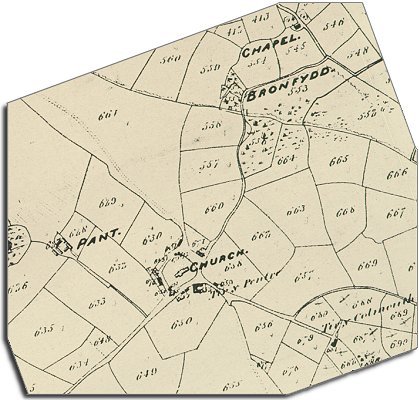The map below is based on the tithe
map of 1840, and it gives us an idea
of the community in the early years of
Queen Victoria's reign.
From the map we can see that Merthyr Cynog
itself was a cluster of buildings around the church. Most people in the
parish lived in scattered farms and holdings. This is a settlement pattern
common in the upland areas of Powys.
The
original map was not aligned with north at the top, so we have turned
it round to make it easier to compare with later maps.

TITHE MAPS
In Victorian times almost everyone had to pay tithes to the Church of England. At the beginning of the reign the tithe became a tax on your property. The maps were drawn to see what property everybody had
